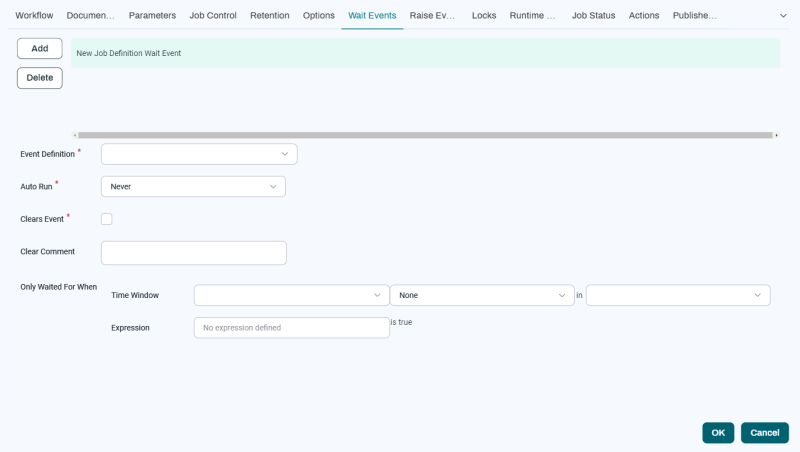Wait Events Tab
Raise Events and Wait Events are not specific types of Event Objects. Rather, they are fields on a Job or Workflow Definition. A Job or Workflow Definition with a Wait Event will not execute until that Event is raised.

A Job or Workflow Definition can have more than one Wait Event. Jobs based on such definitions will not execute until all of their Wait Events have been raised. When a Job is created for a Job or Workflow Definition, that Job must wait for all associated Events to be raised. A Job that is waiting for an Event is given the EventWait status.
Note: A Job waits only once for a specific Event. If the Event was raised, but the Job did not start (for example, due to the closing of a Queue), the Job does not wait again for an Event from the same Event Definition when the Queue is released.
The Wait Events tab includes the following controls.
| Name | Description |
|---|---|
| Event Definition | The Event the Job should wait for. |
| Auto Submit |
Lets you control what happens when the Wait Event is raised. Make sure that all Parameters have default Parameter values and a default Queue is set. The options are as follows.
Note: A Job that is waiting for an Event must be scheduled before it reaches the EventWait status. |
| Clears Event | If this is box is checked, the Job triggered by the Wait Event will clear the Event. This allows other Jobs that share this Wait Event -- but run later -- to react when the Wait Event is next raised. |
| Clear Comment | The comment to be automatically logged by this Job when the Wait Event is cleared. |
| Only Waited For When > Time Window |
Lets you use a Time Window to control whether the Wait Event should trigger the Job. You can specify that the Time Window must be open or closed in a particular time zone in order for the Wait Event to apply. A few notes about this setting:
|
| Only Waited For When > Expression |
Lets you control whether the Job is triggered by the Wait Event using a Boolean REL expression. If the REL expression evaluates to For example: |
Note: If both a Time Window and a Boolean REL expression are associated with a Wait Event, the REL expression will always be evaluated first. In this case, the Time Window will be evaluated only if the REL expression evaluates to true.